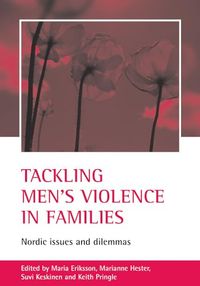
Tackling Men's Violence in Families
Nordic countries are generally regarded as global welfare role models in terms of their image of being gender equal, child-friendly and culturally tolerant. Consequently, the influence of Nordic welfare systems in transnational academic and policy debates has been immense. By focusing on the vital welfare issue of violence by men to female partners and/or their children, this book seeks to reconsider this over-simplistic image. Drawing on new research from Denmark, Finland, Norway and Sweden, the book critically examines how men's violence in families is perceived and responded to in the Nordic context. It pays particular attention to the links between violence to women and violence to children, children's perspectives, professional discourses and responses, and legal and policy approaches. With clear links between research, policy and practice, the book is highly relevant to a wide audience, including academics, researchers and students in the fields of social work, health, criminology, sociology, social policy, gender studies, European studies and law. It is also recommended reading for welfare managers, practitioners, and policy makers.
Utgiven: 2005
ISBN: 9781861346032
Förlag: Policy Press
Format: Inbunden
Språk: Engelska
Sidor: 224 st
Nordic countries are generally regarded as global welfare role models in terms of their image of being gender equal, child-friendly and culturally tolerant. Consequently, the influence of Nordic welfare systems in transnational academic and policy debates has been immense. By focusing on the vital welfare issue of violence by men to female partners and/or their children, this book seeks to reconsider this over-simplistic image. Drawing on new research from Denmark, Finland, Norway and Sweden, the book critically examines how men's violence in families is perceived and responded to in the Nordic context. It pays particular attention to the links between violence to women and violence to children, children's perspectives, professional discourses and responses, and legal and policy approaches. With clear links between research, policy and practice, the book is highly relevant to a wide audience, including academics, researchers and students in the fields of social work, health, criminology, sociology, social policy, gender studies, European studies and law. It is also recommended reading for welfare managers, practitioners, and policy makers.
Begagnad bok (0 st)
Varje vecka tillkommer tusentals nya säljare. Bevaka boken så får du meddelande när den finns tillgänglig igen.



